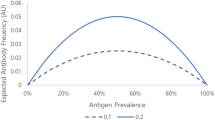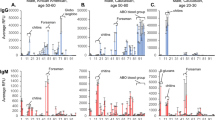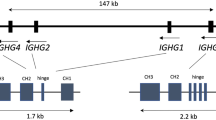Abstract
IN a recent communication, two of us1 described a serum which we think discloses the genotype of half the persons who are homozygous for the blood group factor Rh. This serum, St, agglutinates the red cells of about 80 per cent of people, including the 15–16 per cent who are Rh-negative and all the 48 per cent who are heterozygous, Rhrh. It fails to react with 20 per cent, all of whom must be homozygous Rhrh and be about half the total number of homozygotes (about 38 per cent of all people).
This is a preview of subscription content, access via your institution
Access options
Subscribe to this journal
Receive 51 print issues and online access
$199.00 per year
only $3.90 per issue
Buy this article
- Purchase on Springer Link
- Instant access to full article PDF
Prices may be subject to local taxes which are calculated during checkout
Similar content being viewed by others
References
Race and Taylor, NATURE, 152, 300 (1943).
Wiener and Landsteiner, Proc. Soc. Exp. Biol. and Med. 53, 167 (1943).
Author information
Authors and Affiliations
Rights and permissions
About this article
Cite this article
RACE, R., TAYLOR, G., BOORMAN, K. et al. Recognition of Rh Genotypes in Man. Nature 152, 563–564 (1943). https://doi.org/10.1038/152563a0
Issue Date:
DOI: https://doi.org/10.1038/152563a0
This article is cited by
-
Kreuzreaktionen von Anti-E-Seren mit den Rh-Antigenen E und Ew
Blut Zeitschrift für die Gesamte Blutforschung (1975)
-
Nachweis der H�molyse durch Rh-Antik�rper im Phasenkontrastbild
Klinische Wochenschrift (1954)
-
E-Sensibilisierung Bei Der Cd-Mutter Eines Gesunden Cde-Kindes
Klinische Wochenschrift (1951)
-
Allelomorphs of the Rh gene C
Heredity (1948)
-
Rh Antigens and Antibodies in Man
Nature (1946)
Comments
By submitting a comment you agree to abide by our Terms and Community Guidelines. If you find something abusive or that does not comply with our terms or guidelines please flag it as inappropriate.



